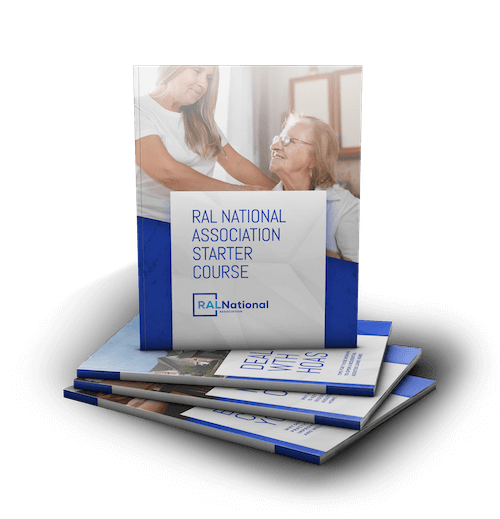Residential assisted living home owners understand that the coronavirus pandemic unquestionably adds stress to caregivers.
This stress can be minimized.
Staying stuck at home for a week during a major snowstorm is difficult. Even worse, being confined to your home for over 100-plus days is almost incomprehensible.
The COVID-19 pandemic has presented a unique set of challenging circumstances for the already stressed caregiver.
Fear, anxiety, and self-isolation cause overwhelming emotions that contribute to depression. Coupled with mental health concerns is the demand of extra caregiving responsibilities.
This leads to fatigue, anger, and resentment which can affect the residents and work environment of your residential assisted living home.
To protect the health and overall well-being of your caregivers, mental health is essential. There are five realistic ways to cope and protect the mental health of RAL caregivers during the pandemic.
5 MENTAL HEALTH TIPS DURING CORONAVIRUS
1. Take Mini Breaks Throughout the Day
One of the keys to taking care of seniors is striving to maintain balance. By allowing caregivers to take tiny breaks throughout the day, you can improve their physical and emotional health. This will give them strength to keep going.
These much-needed breaks help to relieve stress, give caregivers a chance to decompress, and focus on self. It’s important to find a place to be alone. Having a designated alone area is going to be extremely beneficial when it comes to taking mini breaks throughout the day. Below is a list of our top mini-break suggestions.
Top Mini Break Suggestions:
- Consciously relax your jaw, neck, shoulders and back to relieve overall tension in your body throughout the day. Set an alert on your phone to get regular reminders.
- Drink lots of water and afford yourself time for a healthy snack.
- Watch a funny show or video clip.
- Call a good friend.
- Move and stretch your body to loosen tense muscles and get your blood flowing.
- Set a timer for 5 or 10 minutes and play a game on your smartphone or online.
- Read a chapter of a book.
- Do a 5-10 minute guided meditation.
2. Caregivers Should Not Feel Alone
During this pandemic, connecting with other people is more important than ever. Caregivers may be juggling different responsibilities, but the reality is owners, operators and caregivers are going through this pandemic together. Schedule daily or weekly phone or video chats with supportive family and friends. Get creative and play a card game or a tea date over a video call. The virtual possibilities are endless. Owners should inform caregivers to connect with online groups for additional support.
3. Use Humor to Relieve Tension
Life can get heavy during a pandemic and it’s ok to validate caregivers’ laughter. Laughter is medicine for the soul, it eases tension and gives caregivers a positive outlook on life. Also encourage caregivers to use social media to their advantage by following accounts that feature positive, humorous memes about living life during a pandemic.
4. Plan for Quarantine
If your caregivers happen to get sick, but symptoms are manageable, they will still need to self-quarantine. Be sure to have caregivers self-isolate to avoid contact with other staff members and residents. Using masks and washing your hands in RAL homes can help avoid caregivers from getting sick. Be sure to clean and disinfect all surfaces in the assisted living home. The same precautions should be taken if a resident gets sick. Have caregivers wear masks and gloves to protect themselves and avoid spreading any potential virus to other staff or residents.
5. Create a Care Plan
Should your regular caregivers get sick, create a list compiled with essential information that the temporary caregiver will need. Include a special list of helpful details that contains the following information:
- Names and contact information for their doctors
- List of current medications with dosage and refill instructions
- An overview of their daily routine
- Note triggers and effective calming techniques if the senior suffers from Alzheimer’s or dementia
- Instructions on caring for any pets
5 STEPS FOR CREATING A SUCCESSFUL BACKUP CARE PLAN
1. Maintain A Regular Daily Routine And Healthy Lifestyle
2. Improve Sleep
· Identify sleep disruptors
· Try to keep a sleeping schedule
· Remove any additional naps that may have been added
· Add meditation to your evening routine
3. Focus On What You Can Control
4. Lighten Up On Yourself
5. Plan For Alternative Caregivers In Case Your Staff Gets Sick
IDENTIFY POSITIVE SELF-CARE STRATEGIES THAT WORK FOR YOURSELF
The COVID-19 pandemic is a stressful time that has forced major lifestyle changes on everyone.
There’s no blueprint for living through a pandemic, and we shouldn’t expect ourselves to quickly adjust while doing everything that we’ve been accustomed to doing.
In this season of life, it’s a good idea to embrace the undone. That does not mean that owners should allow caregivers to do a bad job.
Embracing the undone means that owners must acknowledge that caregivers are human. Caring for seniors during COVID-19 means taking on a lot, both physically and emotionally.
So, give caregivers a break.
They are doing their best to get through a really challenging time. The first step is to help caregivers identify when they’re taking on too much.
Do not hold staff to an unfair standard.
The next step is to encourage caregivers to use positive reinforcement and to give individuals a break from unnecessary self-criticism.
Encourage your RAL home team to interact with each other like a kind, supportive friend.
Hearing positive, supportive statements in your head reduces stress and is a lot more pleasant and calming than a steady stream of negativity.
Can you identify what other supportive steps you can take to ensure the ongoing self-care of staff during the pandemic?
QUALITY OF LIFE FOR SENIORS START WITH PROFESSIONAL TIPS
Visit www.RALNA.org for additional tips and to get connected to a positive network in the assisted living industry.
RALNA empowers RAL business owners with the resources to provide seniors with quality care.
Residential Assisted Living National Association is helping to improve the quality of life for seniors in assisted living homes across the country.
RALNA supports owners and operators with access to legal expertise, continued education, national marketing, group purchasing power and a positive voice for the industry.











